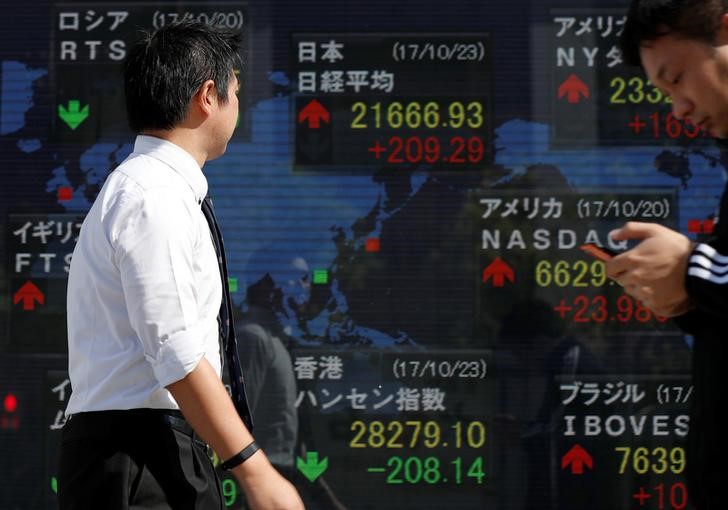Passersby walk past an electronic board showing market indices outside a brokerage in Tokyo, Japan, October 23, 2017. REUTERS/Issei Kato

By Wayne Cole
SYDNEY (Reuters) – Asian markets were ending 2017 in a party mood on Friday after a year in which a concerted pick-up in global growth boosted corporate profits and commodity prices, while benign inflation kept central banks from taking away the punch bowl.
MSCI’s broadest index of Asia-Pacific shares outside Japan was consolidating three straight weeks of gains that left it near decade peaks. The index has been on an upward trajectory for pretty much all of 2017 and is up 33 percent on the year so far.
Hong Kong led the charge with gains of 36 percent for the year, while South Korea notched up 22 percent and India 27 percent.
Japan’s Nikkei and the S&P 500 are both ahead by almost 20 percent, while the Dow has risen by a quarter. In Europe, the German DAX has gained nearly 14 percent, though the UK FTSE has lagged a little with a rise of 7 percent.
Craig James, chief economist at fund manager CommSec, said of the 73 bourses it tracks globally, all but nine have recorded gains in local currency terms this year.
“For the outlook, the key issue is whether the low growth rates of prices and wages will continue, thus prompting central banks to remain on the monetary policy sidelines,” said James.
“Globalisation and technological change have been influential in keeping inflation low. In short, consumers can buy goods whenever they want and wherever they are.”
The Dow ended Thursday with a rise of 0.26 percent, while the S&P 500 gained 0.18 percent and the Nasdaq Composite 0.16 percent.
Tech stocks were the best-performing sector in 2017, with gains of more than 37 percent.
DOLLAR DISAPPOINTS
No nearly so fortunate have been U.S. dollar bulls. The widely held assumption at the start of the year was that, with the Federal Reserve set to raise interest rates further, the only way for the dollar was up.
Yet even though the Fed delivered on its three promised hikes, the currency has failed to benefit.
Measured against its major peers the dollar has shed more than 9 percent so far this year, putting it on track for its biggest annual loss since 2003.
One winner has been the euro which was near its highest in a month on Friday at $1.1942
The dollar even backtracked on the yen despite the Bank of Japan staying doggedly committed to its super-easy monetary policy. As of Friday, the dollar was down 3.4 percent for the year at 112.89 yen
The dollar’s loss has been a boon for commodities priced in the currency, which have also benefited from a synchronized pick up in global trade and surprisingly strong demand from China.
Everything from coal to iron ore has reaped gains, with copper a stand-out performer in part due to expectations of rising demand from the mass electrification of vehicles.
The metallic conductor was near a four-year peak on Friday at $7,286 a tonne. It is up more than 30 percent this year and on course for its largest annual rise since 2009.
Gold has struggled somewhat this year given the background of subdued global inflation but at $1,294.60 an ounce was still on track to end 2017 with gains of over 12 percent.
Oil prices were near their highest in 2-1/2 years after data showed strong demand for crude imports in China and on increased U.S. refining activity that drew more crude from inventories.
Brent crude futures were steady around $66.20 a barrel, up more than 16 percent on the year so far, while U.S. crude futures were up a cent at $59.85 a barrel.
(Reporting by Wayne Cole; editing by Richard Pullin)
Copyright 2017 Thomson Reuters. Click for Restrictions.


